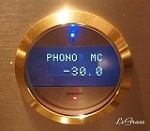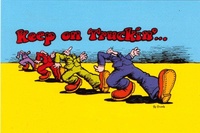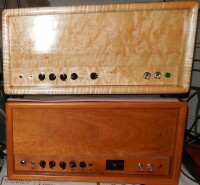Another question for anyone using a GZ37 rectifier tube. Have you altered the value of the cap immediately after the rectifier socket? In the M125 it connects to the 40 uF leg of the quad cap but I'm being advised by a couple of credible sources that this value should be changed to 4 uF when substituting in a GZ37, going by the GZ37 data sheet. 40 is fine for a 5AR4. Except I haven't had very good luck with 5AR4 plus I have a fair amount invested in GZ37.
+6
deepee99
HarryY
Bob Latino
Roy Mottram
cci1492
LeGrace
10 posters
Resistor Type and One Other Question

LeGrace- Posts : 389
Join date : 2016-08-07
Location : Ontario, Canada
- Post n°1
 Resistor Type and One Other Question
Resistor Type and One Other Question
Opened up my second M125 to install AB board into it and noticed that the two of the four 100 ohm resistors are charred black! Values test OK but they sure don't look healthy! When I search resistors quite a few different types come up. Can I use metal film or do I need to stick to carbon film? Amazon has some metal film ones with Prime shipping option.
Another question for anyone using a GZ37 rectifier tube. Have you altered the value of the cap immediately after the rectifier socket? In the M125 it connects to the 40 uF leg of the quad cap but I'm being advised by a couple of credible sources that this value should be changed to 4 uF when substituting in a GZ37, going by the GZ37 data sheet. 40 is fine for a 5AR4. Except I haven't had very good luck with 5AR4 plus I have a fair amount invested in GZ37.
Another question for anyone using a GZ37 rectifier tube. Have you altered the value of the cap immediately after the rectifier socket? In the M125 it connects to the 40 uF leg of the quad cap but I'm being advised by a couple of credible sources that this value should be changed to 4 uF when substituting in a GZ37, going by the GZ37 data sheet. 40 is fine for a 5AR4. Except I haven't had very good luck with 5AR4 plus I have a fair amount invested in GZ37.

cci1492- Posts : 331
Join date : 2016-05-09
Age : 64
Location : NJ
LeGrace, I'm using a GZ33 I think similar to the 37 and haven't changed anything. Doing the yearly checkup/cleaning on my M125s and all resistors look okay (at least on the first amp, haven't open #2 yet).

LeGrace- Posts : 389
Join date : 2016-08-07
Location : Ontario, Canada
Thanks for the replies. The unanswered question for me is what caused these resistors to get burnt like this in the first place? I mean they look like they've been baked in an oven for too long. Is this the likely result of a singular event (ie prior red plate), or could it be a cumulative thing? Anyway I'm going to tighten up my sockets, replace the resistors with new metal film ones, and hope for the best.

Roy Mottram- Admin
- Posts : 1838
Join date : 2008-11-30
for most audio use you'll want to use metal film resistors, but for resistors connected to grids of tubes,
the advice is often to use carbon film to prevent any possible oscillation. Do not use carbon comp resistors for anything,
but the carbon films are fine, and Takman and some others even sell audiophile grade which are excellent.
Also, for most resistors larger than 1 watt I also spec metal oxide resistors.
the advice is often to use carbon film to prevent any possible oscillation. Do not use carbon comp resistors for anything,
but the carbon films are fine, and Takman and some others even sell audiophile grade which are excellent.
Also, for most resistors larger than 1 watt I also spec metal oxide resistors.

peterh- Posts : 1869
Join date : 2012-12-25
Location : gothenburg, sweden
carbon comp resistors are non inductive, thus they keep their properties way up in frequency. Thats why they are the best for grid and screen stoppers. And as such they do not add noise and their exact values are of no concern.
Right tool for the task at hand !!
Right tool for the task at hand !!

Bob Latino- Admin
- Posts : 3277
Join date : 2008-11-26
Location : Massachusetts
I would not use carbon composition resistors in any tube audio gear. With time, carbon composition resistors will usually stray their value UP. After a number of years the values will usually be higher than they were the when the amp was built. Carbon FILM resistors are fine to use in any modern tube amp as are metal film and metal oxide resistors. If you have a vintage two channel stereo tube amp that is 40+ years old and has carbon composition resistors, most likely the resistor sets will NOT match closely from channel to channel after 40 years. This will lead to channel imbalance and degraded sound quality.
Bob
Bob

Guest- Guest
.
Last edited by PeterCapo on Mon Nov 30, 2020 8:34 pm; edited 1 time in total

LeGrace- Posts : 389
Join date : 2016-08-07
Location : Ontario, Canada
I just learned a lesson, never to be forgotten. With amp powered I put my finger on one of the non charred resistors, it was cool to the touch. Then I put my finger on one of the charred ones to see if it was getting hot. I ended up on the other side of the room with smoke coming out of my hair. A slight exaggeration, but not by a lot, I got a wicked shock. I will never ever physically touch anything inside these amps with the power on ever again!!!!!

Guest- Guest
.
Last edited by PeterCapo on Mon Nov 30, 2020 5:56 pm; edited 1 time in total

LeGrace- Posts : 389
Join date : 2016-08-07
Location : Ontario, Canada
- Post n°10
 Re: Resistor Type and One Other Question
Re: Resistor Type and One Other Question
PeterCapo wrote:Glad you are still here to tell the tale.
Thanks, I am emotional right now about how close I might have come to electrocuting myself. I feel like a prime candidate for a Darwin award.

Guest- Guest
- Post n°11
 Re: Resistor Type and One Other Question
Re: Resistor Type and One Other Question
.
Last edited by PeterCapo on Mon Nov 30, 2020 4:29 pm; edited 1 time in total

HarryY- Posts : 46
Join date : 2019-07-24
Location : NY
- Post n°12
 Re: Resistor Type and One Other Question
Re: Resistor Type and One Other Question
500 Volts DC is pretty healthy and worth being very careful around.
High Voltage is to be respected, it can definitely ruin your day.
High Voltage is to be respected, it can definitely ruin your day.

Guest- Guest
- Post n°13
 Re: Resistor Type and One Other Question
Re: Resistor Type and One Other Question
.
Last edited by PeterCapo on Mon Nov 30, 2020 4:28 pm; edited 1 time in total

cci1492- Posts : 331
Join date : 2016-05-09
Age : 64
Location : NJ
- Post n°14
 Re: Resistor Type and One Other Question
Re: Resistor Type and One Other Question
As a kid I used to go around the neighborhood on garbage nights to collect TV sets and radios. I learned the same way about reaching in a live tv set and then again on one that wasn't plugged in trying to get a picture tube out. Something you never forget!

deepee99- Posts : 2244
Join date : 2012-05-23
Location : Wallace, Idaho
- Post n°15
 Re: Resistor Type and One Other Question
Re: Resistor Type and One Other Question
Peterw,
Is not a Variac an isolation transformer? Or do you need two separate windings to make an isolation xformer?
Is not a Variac an isolation transformer? Or do you need two separate windings to make an isolation xformer?

deepee99- Posts : 2244
Join date : 2012-05-23
Location : Wallace, Idaho
- Post n°16
 Re: Resistor Type and One Other Question
Re: Resistor Type and One Other Question
Gotcher. Variac regrettably has fallen into the vernacular, as have kleenex and ketchup which are also brand names.

LeGrace- Posts : 389
Join date : 2016-08-07
Location : Ontario, Canada
- Post n°17
 Re: Resistor Type and One Other Question
Re: Resistor Type and One Other Question
Replaced the two blackened resistors. Despite the severe charring amazingly they both still test within a couple ohms of the specified value. Undoubtedly why everything was still sounding fine. Although I can now see why I got the shock. Outer casing is partially vaporized away, exposing the internal circuitry.

deepee99- Posts : 2244
Join date : 2012-05-23
Location : Wallace, Idaho
- Post n°18
 Re: Resistor Type and One Other Question
Re: Resistor Type and One Other Question
LeGrace, I'm only guessing that you're luck deficient here, but if that's the case, boost a pair of lead-asbestos gloves from your local fire station or firefighter. Or better yet, wear a straightjacket when you're working on powered-up gearLeGrace wrote:Replaced the two blackened resistors. Despite the severe charring amazingly they both still test within a couple ohms of the specified value. Undoubtedly why everything was still sounding fine. Although I can now see why I got the shock. Outer casing is partially vaporized away, exposing the internal circuitry.

peterh- Posts : 1869
Join date : 2012-12-25
Location : gothenburg, sweden
- Post n°19
 Re: Resistor Type and One Other Question
Re: Resistor Type and One Other Question
A man has to take some voltages !LeGrace wrote:I just learned a lesson, never to be forgotten. With amp powered I put my finger on one of the non charred resistors, it was cool to the touch. Then I put my finger on one of the charred ones to see if it was getting hot. I ended up on the other side of the room with smoke coming out of my hair. A slight exaggeration, but not by a lot, I got a wicked shock. I will never ever physically touch anything inside these amps with the power on ever again!!!!!
The important thing is that the current is limited ( good isolation) and does not pass the chest area, in addition that no muscles will increase the grip ( poking with finger is ok, grabbing with the hand is not ok)

deepee99- Posts : 2244
Join date : 2012-05-23
Location : Wallace, Idaho
- Post n°20
 Re: Resistor Type and One Other Question
Re: Resistor Type and One Other Question
In reality, I was always taught to keep one hand in the back pocket of one's trousers if the gizmo was plugged in. This one-handed approach pretty much prevents you from doing anything beyond wielding the red meter-probe one-handedly. You don't need to move the black (ground) one around so secure it to a good ground first. The are times when you need both hands for both probes (e.g. to measure a resistor or locate a short) but the beauty of that is that the majority of those tests do not require any juice from the amp to measure their values.peterh wrote:A man has to take some voltages !LeGrace wrote:I just learned a lesson, never to be forgotten. With amp powered I put my finger on one of the non charred resistors, it was cool to the touch. Then I put my finger on one of the charred ones to see if it was getting hot. I ended up on the other side of the room with smoke coming out of my hair. A slight exaggeration, but not by a lot, I got a wicked shock. I will never ever physically touch anything inside these amps with the power on ever again!!!!!
The important thing is that the current is limited ( good isolation) and does not pass the chest area, in addition that no muscles will increase the grip ( poking with finger is ok, grabbing with the hand is not ok)
Jewelry is an absolute no-no. Wedding rings and wrist-watches are excellent conductors, plus if you drop a power amp on your ring the tip of the finger will soon develop gangrene.

gktamps- Posts : 34
Join date : 2017-07-30
Location : Santa Rosa, CA
- Post n°21
 Re: Resistor Type and One Other Question
Re: Resistor Type and One Other Question
And conversely, in guitar amplifier design and construction, selection of carbon comps as plate resistors is often a design choice because of the shot noise and Johnson noise they contribute in that and other locations; this noise is one of the components of a vintage tone.
It seems the two largest concerns with CC resistors is noise when it isn't wanted in a circuit, and drift, usually from moisture absorption.
It seems the two largest concerns with CC resistors is noise when it isn't wanted in a circuit, and drift, usually from moisture absorption.

peterh- Posts : 1869
Join date : 2012-12-25
Location : gothenburg, sweden
- Post n°22
 Re: Resistor Type and One Other Question
Re: Resistor Type and One Other Question
None of these concerns are applicable when used as stoppers.gktamps wrote:And conversely, in guitar amplifier design and construction, selection of carbon comps as plate resistors is often a design choice because of the shot noise and Johnson noise they contribute in that and other locations; this noise is one of the components of a vintage tone.
It seems the two largest concerns with CC resistors is noise when it isn't wanted in a circuit, and drift, usually from moisture absorption.
Also; the scary stories about the drifting CC resistors are aggregated. One should not be scared from them when used with care and good judgement. Avoiding high values plate resistors is one such area where other types are better.

Guest- Guest
- Post n°23
 Re: Resistor Type and One Other Question
Re: Resistor Type and One Other Question
.
Last edited by PeterCapo on Mon Nov 30, 2020 4:28 pm; edited 1 time in total

gktamps- Posts : 34
Join date : 2017-07-30
Location : Santa Rosa, CA
- Post n°24
 Re: Resistor Type and One Other Question
Re: Resistor Type and One Other Question
peterh wrote:None of these concerns are applicable when used as stoppers.
Also; the scary stories about the drifting CC resistors are aggregated. One should not be scared from them when used with care and good judgement. Avoiding high values plate resistors is one such area where other types are better.
I didn't suggest they were. I gave an example of using them purposely for the effect as plate resistors in guitar amps, just to add some context.
I also didn't suggest fearing anything, let alone resistors. However, I have thousands of CC resistors that have drifted 20-50% in value. Perhaps they could be baked, but I've decided not to use them because of this. On the other hand, I've got properly stored CC resistors that are still pretty close in tolerance.

Guest- Guest
- Post n°25
 Re: Resistor Type and One Other Question
Re: Resistor Type and One Other Question
.
Last edited by PeterCapo on Mon Nov 30, 2020 4:28 pm; edited 1 time in total
